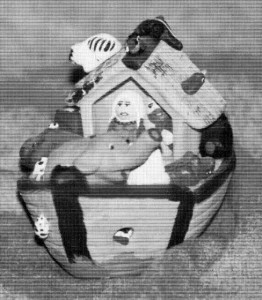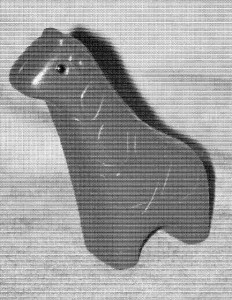 Of Noah, and God’s Broken Heart Of Noah, and God’s Broken Heart
|
As the father of two boys not yet three years old, I found a curious fact in the playroom, endorsed by toys, cartoons and children’s books: the whole world seems to love Noah and the Ark full of animals. The children can’t get enough of him. In scene after pictured scene, Noah, his wife, and his three sons and their wives, build a beautiful, impressive Ark that sails the depth of the Deluge until the dove comes back from the subsiding waters with an olive branch, then returns no more.
Noah, as far as I can tell, has no enemies anymore, but legions of young admirers who know the story of how the human race was saved.
It is something of a wrench to put the orange giraffe back into the toy chest and turn to the Book of Genesis, Chapter 6, where the actual story begins.
Noah is there, all right; “Noah was a righteous man, blameless among the people of his time, and he walked with God.” [verse 9] The animals are there, too, and not just the lions, elephants and giraffes: “Two of every kind of bird, of every kind of animal and of every kind of creature that moves along the ground will come to you to be kept alive.” [verse 20]
 But it turns out not to be just a happy tale of childhood: Noah is the only man on earth who truly pleases God; the central act of his life comes in the midst of a terrible tragedy.
But it turns out not to be just a happy tale of childhood: Noah is the only man on earth who truly pleases God; the central act of his life comes in the midst of a terrible tragedy.
“The flood,” you say, “Don’t be so melodramatic! I know there was a huge flood.”
But the flood wasn’t the great tragedy. “The Lord saw how great man’s wickedness on the earth had become, and that every inclination of the thoughts of his heart was only evil all the time.” [verse 5]
In the face of the abject moral failure of the human race, “The Lord was grieved that he had made man on the earth, and His heart was filled with pain.”
God grieved more over the ruin of sinful human nature than anything else. He knew it was an eternal ruin, unless something could be done.
The Scriptural Trail of Sorrow
The Flood was a judgement on moral failure, on a selfish, hateful streak through human nature that polluted everything from deeds to secret thoughts. The trouble was, even the Flood didn’t end the problem: Corruption in the human heart passed on from generation to generation.
Many centuries later, King David of Israel wrote,
“The Lord looks down from heaven on the sons of men
to see if there are any who understand,
any who seek God.
All have turned aside, they have together become corrupt;
there is no one who does good, not even one.” [Psalm 14]
Other hundreds of years later, the prophet Isaiah declared God’s summary of the condition:
No one calls for justice;
no one pleads his case with integrity.
They rely on empty arguments and speak lies;
they conceive trouble and give birth to evil.
…Their deeds are evil deeds, and acts of violence are in their hands.
Their feet rush into sin; they are swift to shed innocent blood. Their thoughts are evil thoughts; ruin and destruction mark their ways.
The way of peace they do not know; there is no justice in their paths. [Isaiah 59]
The state of their hearts sounds just like the one that called down the Flood, doesn’t it? But Isaiah also prophesied that the God whose heart was full of pain over man’s failure in Noah’s day, had an answer, not just perpetual regret. His answer surprised almost everyone…
“… a man of sorrows, and familiar with suffering. Like one from whom men hide their faces he was despised, and we esteemed him not.
Surely he took up our infirmities and carried our sorrows, yet we considered him stricken by God, smitten by him, and afflicted.
But he was pierced for our transgressions, he was crushed for our iniquities; the punishment that brought us peace was upon him, and by his wounds we are healed.
We all, like sheep, have turned astray, each of us has turned to his own way; and the Lord has laid on him the iniquity of us all.
For he was cut off from the land of the living; for the transgression of my people he was stricken.
After the suffering of his soul, he will see the light of life and be satisfied; by his knowledge my righteous servant will justify many, and he will bear their iniquities.
…He poured out his life unto death, and was numbered with the transgressors.
For he bore the sin of many, and made intercession for the transgressors.” [Isaiah 53]
God sent one righteous man into the world, a man of sorrows with the power to put a final end to sorrow. He was the long-prophesied Messiah, God’s Anointed, and his name is Jesus.
Because of him, Ezekiel could prophesy,
“I will give you a new heart and put a new spirit in you;
I will remove from you your heart of stone and give you a heart of flesh. And I will put my Spirit in you and move you to follow my decrees and be careful to keep my laws.”
God has utterly solved our problem of heart. He bought time for the human race, one could say, with the Flood. He bought back our very hearts and souls with the sacrificial offering of His own Anointed.
Turn to God for that cleansing of heart, and that new heart, and you will find wonderful new meaning to “entering into the Ark” of safety with God. He designed the Ark for Noah, and He designed rescue and salvation through Jesus, the Christ and Messiah, for you.
Philip K. Chamberlain, Branford ’70
© 1993 The Yale Standard Committee

